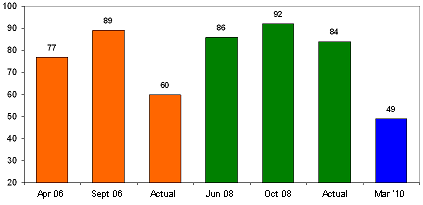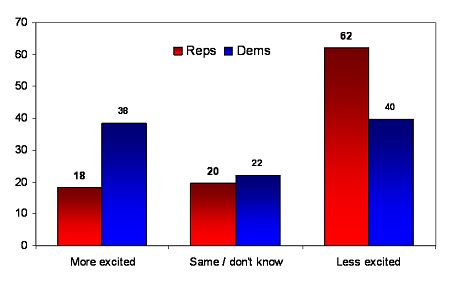On the value of “Introduction to American Government” versus a law degree from Harvard…
No reasonable person would dispute the innate intelligence and intellectual capacity of President Obama, or for that matter most of his advisers. But as we approach the 2010 election, few, too, would dispute that the Democrats are in a bit of trouble—less trouble than if the health bill had crashed and burned, but trouble nonetheless. And much of that trouble will come not from the mobilized but ridiculously over-hyped “tea-partiers” but, rather, through the absence of core constituents who are disappointed with the administration to date. Among all the key constituents in the 2008 Obama victory, Latino voters appear to be among the least enthusiastic about voting in the 2010 midterm…. more in this in just a minute…
I heard Valerie Jarrett speak recently, and was pained to hear her, once again, refer to Obama as a “transformative figure.” Enough, already! This may well be so by virtue of his being the first administration in American history to be run by an African American, but that, alas, doesn’t necessarily win (or hold) seats this November. While the President clearly believes—or at least believed until recently—that he and his rhetorical gifts could overcome partisan divisions to build a consensus-oriented, problem-solving record of bipartisanship, someone forgot to notify his Republican opponents.
The last year has marked repeated escalations in partisan rhetoric and right wing hysteria and, until recently, the President seemed unwilling to accept the mandate that the American people gave him and his party, first with the change of majorities in both houses of Congress in 2006, and more finally in the 8-point victory for Obama and his party in 2008. Rather than use a pair of Democratic victories as license to enact Democratic policies, the administration repeatedly tacked to the center, in hopes of drawing out the few remaining GOP moderates and presenting the American people a broad governing coalition standing against an increasingly isolated fringe. The most ludicrous example of this strategy was the administration’s insistence that the Senate negotiators continue to engage Chuck Grassley (R-IA) while he was denouncing them as “grandma-killers.” The GOP “moderates” weren’t willing to play, and the Obama agenda faced eight tedious months of stagnation and outspoken, hostile backlash.
Most distressing, the health bill that passed this month is not substantively any better than the administration might have gotten last October. For all the sturm and drang, the result was a bill so centrist it actually drove insurers’ stock prices UP after its passage in December and again in March, and yet didn’t attract a single GOP vote.
The backlash I am most interested in has come from his left rather than from the lunatic-fringe of the right, and it is here that a well-taught section on American government might make the difference. First, as our freshmen students in Introduction to American Government understand, compromise involves both sides moving. Second, mid-term elections are won on party core constituents, not on part-time voters and ticket-splitters who occasionally turn up for presidential elections but almost never in mid-terms. This phenomenon of midterm demobilization of the president’s electoral coalition is a finding older than the President himself.
Unfortunately for Democrats in November, on almost every key issue, the President has forsaken a core constituency either in hopes of attracting and retaining moderate and independent voters or through inaction entirely. Gay and lesbian activists have organized a boycott of DNC and OFA fundraising for the President’s inaction on LGBT legislative priorities, and even went so far as to have his justice department file briefs defending the Defense of Marriage Act by comparing gay relationships to incestuous intercourse with one’s uncle. This is from a self-described “fierce advocate” of gay and lesbian equality. Organized labor worked tirelessly for the Obama candidacy in hopes of achieving a more pro-labor regime, including card-check union organizing elections. What they got for their efforts was a tax on union-quality health care plans. Civil libertarians got no torture trials or indictments (and none appear to be coming), financial reform advocates are still waiting for the first perp-walk of Wall Street charlatans (who continue to receive taxpayer subsidized bonuses over little or no White House objection), and Guantanamo remains open.
For Latinos, the promise of immigration reform—signaled, during the campaign, for the administration’s first year, then before the midterm election—is as yet unfulfilled. Instead, stepped up enforcement by the border patrol, including sweeps and raids that target working mothers and fathers rather than employers and criminals, are justified with the claim that this is the price of buy-in by those on the right for comprehensive immigration reform. Anybody see a line forming of Republicans and conservative Democrats anxious to join that cause?
The collective effect of this rightward drift and frequent inaction is a shocking enthusiasm gap between Democrats and Republicans documented widely in the blogosphere and elsewhere. New polling data from Latino Decisions is our attempt to estimate this effect among Latinos. We find Latino enthusiasm for voting in the November 2010 is at an all time low. In 2006 when Republicans held the White House, the Senate, and the House, and immigration marches mobilized millions of Latinos around the country interest in the midterm was at record levels. Now, four years later, many Latino voters do not see an urgency in turning out. In April 2006, a Latino Policy Coalition survey (which LD principals helped write) found that 77% of Latino registered voters stated they were certain to vote, a measure of enthusiasm that grew to 89% determined to vote by September 2006. By that November, about 60% actually voted.
Compare those numbers to our recent data. As of March 2010, Latino Decisions survey data finds that just 49% of Latino registered voters say they are very enthusiastic about voting. Since 60% of Latinos turned out in 2006 when their self-reported enthusiasm was 77%, what does that spell for 2010 if the starting point for enthusiasm is only 49%?

The low enthusiasm for voting mirrors low levels of excitement about both the Democratic and Republican Parties. When asked how their excitement for each political party had changed since January 2009, neither party had close to majority excitement. Republicans in Congress, who have made little attempt to reach out to Latinos continue to suffer a credibility gap. 18% of Latinos are more excited about the GOP, compared to 62% less excited and 20% no change. Since Latinos nationwide generally report GOP partisan identity between 16 and 20%, you should read that excitement number as reflecting core partisanship, but the high number for “less excited” suggests some hardening of Latino attitudes against the GOP.
For Democrats, however, the numbers aren’t much better: 38% are more excited, 40% less excited and 22% no change. This is a pretty significant variation from normal partisan patterns and really suggestive of the disappointment level felt by many Latino voters. On the one hand, you might wonder if this decline in enthusiasm was inevitable—no administration can live up to all voters expectations at the time of election. On the other hand, one never wants the balance of excitement by co-partisans to be net-negative while you control all three elected branches of national government. Since Democrats will never be in a better position to deliver policy outcomes to Latinos and other core groups than they are today, these constituency groups in general, and Latinos in particular, are right to find the progress so far extremely worrisome.

Is all lost for the Obama coalition in the 2010 midterms? Of course not, and our view is that recent events bode well for both the administration’s willingness to lead and for the resulting enthusiasm likely to come from core constituencies. The lesson of the health care overhaul appears to have sunk in, and recent actions—including recess appointments, rolling student loan reform into the reconciliation bill, and some pretty key strategizing on financial reform—all hint of an administration that realizes it must act, and that its actions will mobilize its supporters and cost it nothing among its detractors, who have already double-downed on their strategy of opposing everything. For Latinos, there will have to be a genuine attempt on the part of the administration and Democrats in Congress to act on immigration. Even if it fails, an honest effort (and the inevitable, ugly, GOP response) will help close the yawning enthusiasm gap between Latinos of 2010 and Latinos of 2006. And should it pass, as it ought to, the rewards will be palpable.

